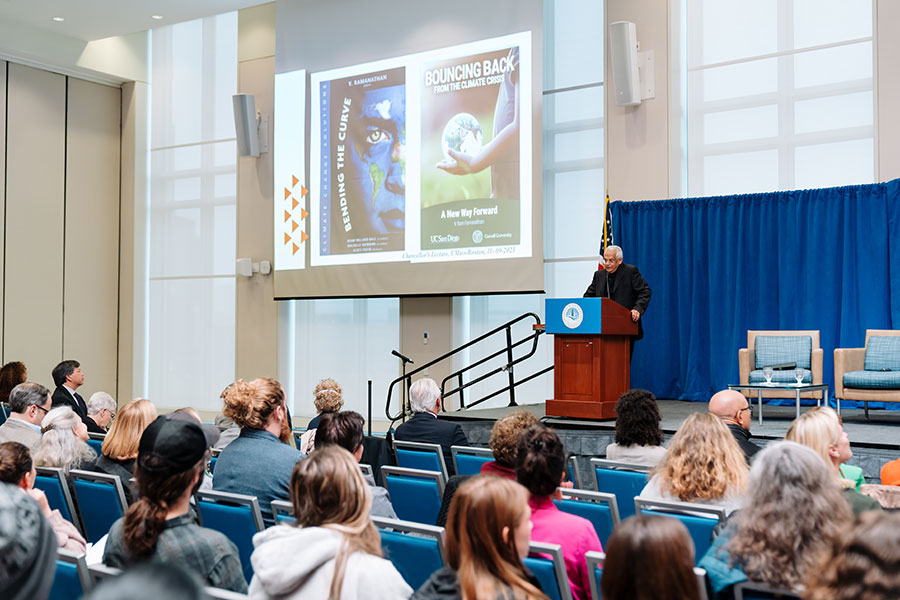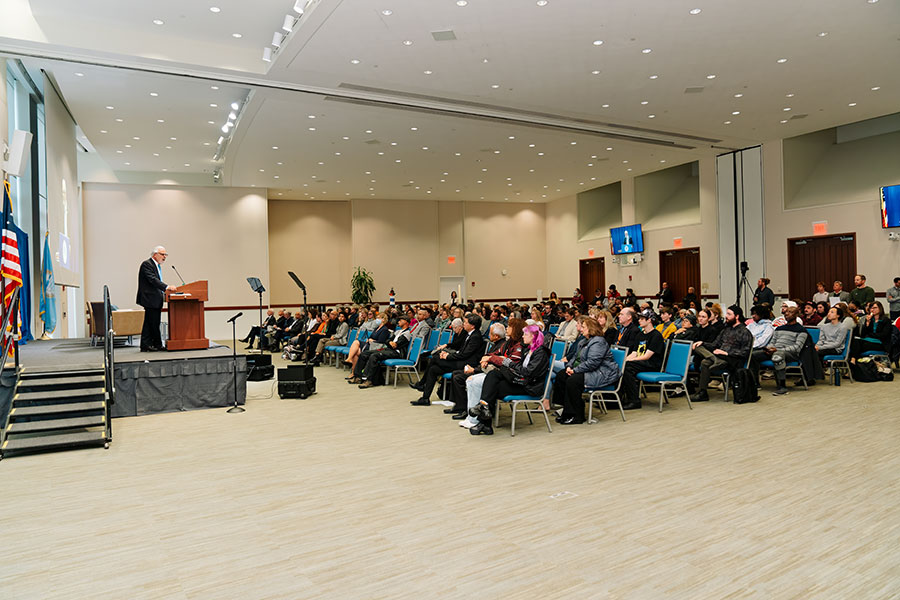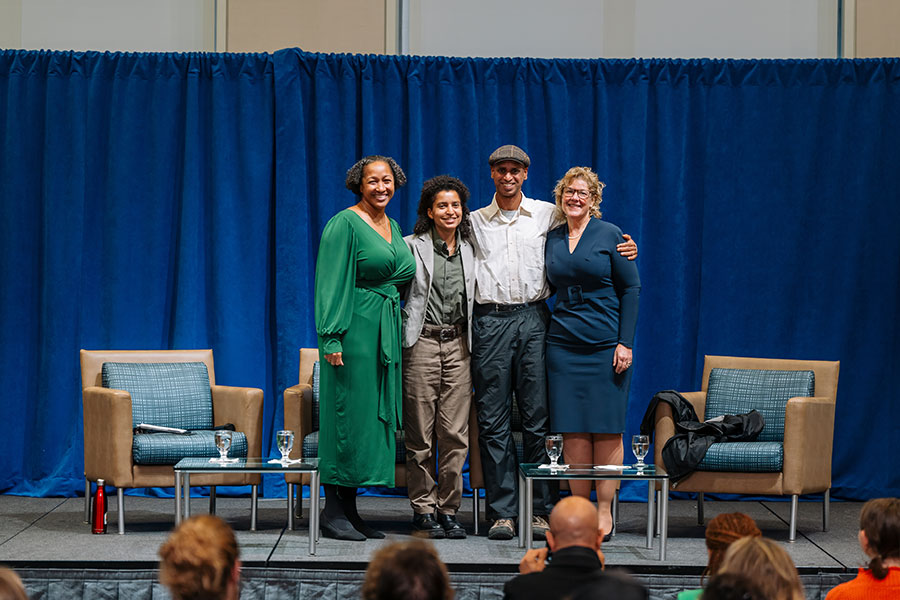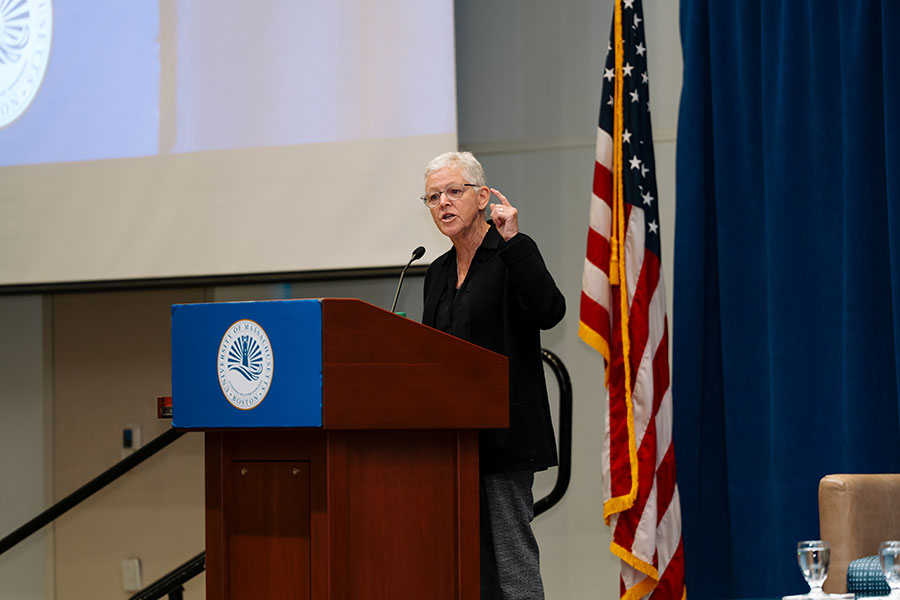- Home
- News
- Recent News
- Ram Ramanathan Headlines Lecture Series
Dr. Ram Ramanathan Headlines Chancellor’s Lecture Series, Offers Path to Climate Resiliency
World-renowned scholar Dr. Ram Ramanathan joined Chancellor Marcelo Suárez-Orozco this month for the kick-off of the Chancellor’s Lecture Series: “From Climate Crisis to Climate Resilience” to offer a groundbreaking strategy that aims to not only bend the emissions curve but also to make communities and ecosystems resilient to climate stress.

Climate change has morphed into climate crisis, with this last year giving us a peek into a world that is warmer by 1.5°C— heat waves, forest fires, droughts, floods, hurricanes, and an increase in the risks of food, water, and vector-borne diseases. World-renowned scholar Dr. Ram Ramanathan says that by 2030, climate change will be inevitable, moving into everyone’s living rooms like COVID.
“We will all feel it. Just like with COVID, even if you didn’t get it, your friends or your parents, or somebody else you know got it,” he said. “I hope I convince you it's not 30 years from now, it's not 100 years from now, it's five to six years from now we're going to pass a major threshold.”
Ramanathan joined Chancellor Marcelo Suárez-Orozco this month for the kick-off of the Chancellor’s Lecture Series: “From Climate Crisis to Climate Resilience” to offer a groundbreaking strategy that aims to not only bend the emissions curve but also to make communities and ecosystems resilient to climate stress.
“The biggest challenge we face—Why are we not solving this problem? Why are we not bending the curve? It's not because we don't have technology; it's not because we don't have the governance system; and it's not because we lack solutions,” Ramanathan said. “There are hundreds of solutions to solve the problem. We just don't have the support.”
Ramanathan, a distinguished professor emeritus of climate sustainability at Scripps Institution of Oceanography, discovered the greenhouse effect of CFCs in 1975, establishing the now accepted fact that non-CO2 gases are a major contributor to planet warming.
His approach to bending the curve and bouncing back to climate resilience, developed in partnership with the Vatican's Pontifical Academies, is built on three pillars: mitigation, adaptation, and societal transformation. The approach will be shared with mayors and governors from around the world, who will be convened at the Vatican in a summit next year. Chancellor Suárez-Orozco and Dr. Ramanathan are co-leading this effort on behalf of the Pontifical Academies.
A recently published survey showed that while 63 percent of Americans agree climate change is causing harm to people; in the same group only 23 percent thought major sacrifices will have to be made.
“The rest—77 percent—think, ‘Oh it's just going to be minor,’ or ‘You know, we don't need to do any sacrifice,’” he said. “It's not that we want to blame them for it, it is just that I feel we as scientists, we have failed in communicating the seriousness of the issue and more than the seriousness, the urgency.”
Ramanathan did point to some positive things happening. While in 2020, one in 25 cars sold were electric, that number has improved to one in five. Globally, we are spending about a billion dollars a day on solar deployment. The rise in clean energy investment is leading the way, outpacing the increase in fossil fuel investment. The Inflation Reduction Act will deploy nearly $400 billion over the coming decade to slash carbon emissions.
Ramanathan said climate change needs to be viewed not only as an environmental issue, but as a global public health crisis.
“We have got to change the narrative on our climate problem. See, we tried in 1975, 1980. We've talked about polar bears, then we moved to pandas, saving the pandas, then we moved to coral reefs. Nothing worked,” he said. “Thanks to our former EPA head and White House advisor Gina McCarthy, aggressive laws were passed and they were all for health reasons.”

Chancellor Suárez-Orozco praised Ramanathan’s work, saying his “unwavering commitment to investigating, to educating to talking in truth to power, and enlightening the world on climate change and the impacts of human activity on the environment has set him apart as an undisputed leader in the world's epic battle against climate.”
He said UMass Boston is ready to help lead in this climate crisis.
“Now is the time, and UMass Boston and the Commonwealth of Massachusetts are the place to seize the opportunities and make lasting change,” Suárez-Orozco said. “The climate crisis urgently calls on us to build new pathways for sustainable development, sustainable consumption of natural resources, and an informed stewardship of the planet ensured to lead a movement to a sustainable humanity.”

The event also featured opening remarks by Massachusetts Climate Chief Melissa Hoffer, and a panel with Reverend Mariama White-Hammond, Chief of Environment, Energy, and Open Space for the City of Boston; Hoffer; Kannan Thiruvengadam, Director of Eastie Farm; and Sommer Heyman, a UMass Boston undergraduate student.
Hoffer spoke of how Ramanathan’s strategy of societal transformation is often a critical and missing piece in our thinking about climate change today.
“We really need to get people ready for what's coming and indeed for what's already here,” Hoffer said. “My office has recently recommended to the governor that we urgently evaluate the scale of investment required to meet our 2050 Net Zero goal— implement key resilience measures, not just planning, and identify the necessary funding and financing so that we can speed implementation. We've also recommended that the Commonwealth implement a sweeping public education campaign and civilian climate corps to help ready our communities.”

Former White House Climate Advisor and UMass Boston alumna Gina McCarthy offered closing remarks, saying she would be leaving the stage more optimistic than she has ever been.
“We can build this future that we want,” McCarthy said. “We don't need to be creative. We need to be bold. We don't need to sit on the sidelines. We need to jump into the fray, and this school taught me that, because this school is what taught me that we have a moral obligation to ourselves and to others.”
“This school taught me how to deliver on it. This school is what's brought me to today, and if we can learn to do what this school has taught us—the lessons of science mixed with the lessons of culture, the lessons of politics, our understanding of how to communicate and how the world processes and motivates change. If we can do that, all of us will hold our heads up high because we will be the best Beacons ever."
